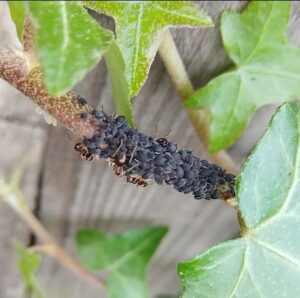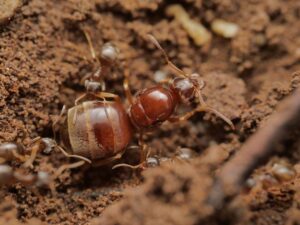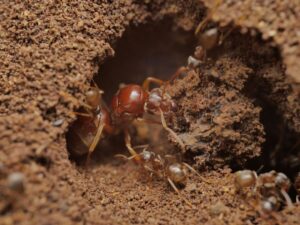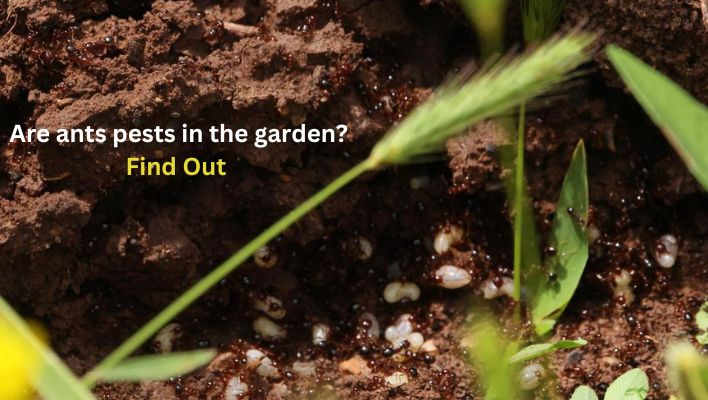Are ants pests in the garden? This is a question that many gardeners ask themselves when they notice these tiny crawlers marching through their garden beds. While ants may seem harmless, they can cause a lot of damage to your garden if left unchecked.
These industrious creatures are fascinating to watch as they scurry about their business, but when they start to damage your plants or disturb the soil, it’s natural to wonder whether they’re causing more harm than good.
From disturbing the soil to protecting aphids, ants can be a nuisance for any gardener trying to maintain a healthy and thriving garden. But don’t worry, there are ways to control ants in your garden and prevent them from becoming a pest.
In this article, we’ll take a closer look at the relationship between ants and gardens, explore the reasons why ants invade gardens, and discuss how to control ants in the garden to your garden thrives below.
What ants do in the garden
Ants are known for their impressive work ethic, and the garden is no exception. They may be small, but they can have a big impact on your garden. Here’s a closer look at what ants do in the garden, and how their activities can impact your plants and garden structures.
Ants and their Impact on plant growth
While ants aren’t typically considered major garden pests, they can have an indirect impact on plant growth. Some species of ants, such as carpenter ants, can excavate soil and create tunnels that can disrupt root systems and compromise the stability of plants.
Additionally, ants can cultivate aphids and other plant-sucking insects, which can damage plants by feeding on their sap. In exchange, the ants protect the aphids from predators and parasites, allowing them to continue feeding on the plants.
This can lead to increased populations of plant pests, which can cause stunted growth, yellowing leaves, and other symptoms of plant stress.

Ants and their Impact on other insects in the Garden
On the other hand, ants can also prey on other insects that might be harmful to your garden plants. For example, some ant species will hunt grasshoppers, caterpillars, and other soft-bodied insects, providing a natural form of pest control.
However, their predatory behavior isn’t always beneficial. Some species of ants can be aggressive and attack beneficial insects, such as ladybugs and lacewings, that feed on garden pests. Additionally, as mentioned earlier, some ants cultivate aphids, which can attract other pests to the garden.
How ants can cause damage to garden structures:
In addition to their impact on plants and insects, ants can also cause damage to garden structures. Carpenter ants, in particular, are known for their ability to chew through wood and can cause structural damage to decks, fences, and other wooden garden features.
They can also cause damage indirectly by excavating soil and creating underground tunnels. Over time, this can cause soil erosion and make garden structures unstable.
Additionally, ants can make their homes in cracks and crevices in garden structures, which can weaken the integrity of these features over time.
So while ants may not be the most destructive garden pests, they can still have an impact on your garden ecosystem. In the next section, we’ll take a closer look at why ants are attracted to gardens, and how you can control their presence.
Are Ants Garden Pests
Ants can be considered garden pests, as they can cause damage to plants, garden structures, and even other insects.
While some species of ants are beneficial to gardens, others can cause harm, such as by farming aphids or other plant-damaging insects, or by disturbing the soil and plant roots.
It is important to identify the type of ant infestation and take appropriate measures to control it to maintain a healthy and productive garden.

Different types of ants found in gardens
Ants are one of the most diverse and successful groups of insects, with over 12,000 known species worldwide. While not all of these species are found in gardens, several types of ants are commonly encountered in garden environments. Here’s a closer look at some of the most common types of ants found in gardens:
- Carpenter ants: Carpenter ants are one of the largest ant species and are known for their ability to chew through wood. They don’t eat the wood, but instead, create galleries and tunnels to build their nests. In gardens, carpenter ants can be found nesting in dead trees, stumps, and other wooden structures.
- Argentine ants: Argentine ants are a non-native species that have become widespread in many parts of the world, including the United States. They are highly aggressive and can form massive colonies with multiple queens. In gardens, Argentine ants are often found nesting in soil, under rocks, and in other protected areas.
- Pavement ants: Pavement ants are small, brown ants that are often found nesting in cracks in the pavement, hence their name. In gardens, they can be found nesting under rocks, in mulch, and other protected areas.
- Odorous house ants: Odorous house ants are small, brown ants that emit a distinctive odor when crushed. They are often found nesting in soil, under rocks, and in other protected areas. In gardens, odorous house ants can be attracted to sweet or sticky substances, such as honeydew produced by aphids.
- Fire ants: Fire ants are a highly aggressive species that can inflict painful stings. They are often found in warm, sunny areas and build large, visible mounds in the soil. In gardens, fire ants can be a particular nuisance, as their stings can be a danger to gardeners and pets.
These are just a few of the many types of ants that can be found in gardens. The type of ants you find will be determined by the condition of the garden and what plants you have.
Signs of ant infestations in the garden
Ants can be a common sight in gardens, but when their populations grow out of control, they can become a nuisance and even cause damage. Here are some signs that you may have an ant infestation in your garden:
- Ant trails: If you notice a steady stream of ants moving back and forth between a food source and their nest, you likely have an ant trail. Ant trails are typically found on hard surfaces, such as pavement or rocks, and can be a sign that ants have established a nest nearby.
- Mounds or Anthills: Certain species of ants, such as fire ants, build visible mounds in the soil. These mounds can be a sign of a large and established colony and should be dealt with promptly to prevent further spread.
- Damage to plants: As mentioned earlier, some species of ants can cultivate aphids and other plant-sucking insects, which can damage plants by feeding on their sap. If you notice leaves that are yellowing, curling or have small holes, it could be a sign that aphids are present and that ants are farming them.
- Damage to garden structures: Carpenter ants, in particular, can cause damage to wooden garden structures. If you notice small piles of sawdust or wood shavings near wooden structures, or if you hear a rustling sound coming from within the wood, it could be a sign that carpenter ants have made a nest.
If you notice any of these signs, it’s important to take action to control the ant population and prevent further damage to your garden. In the next section, we’ll explore some tips and techniques for controlling ants in the garden.

Are ants beneficial or harmful to the garden?
The answer is a bit more complicated than a simple yes or no, as ants can have both positive and negative impacts on the garden environment. Here are some of the pros and cons of having ants in the garden:
Pros:
- Pest control: Certain species of ants, such as the Argentine ant, are known for their voracious appetite for other insects. They can help control populations of pests like caterpillars and aphids, which can damage garden plants.
- Soil aeration: Ants help to aerate the soil by creating tunnels and burrows, which allow water and oxygen to penetrate more deeply into the soil.
- Pollination: Some species of ants are known to pollinate plants, although their role in pollination is not as significant as bees and other pollinators.
Cons:
- Damage to plants: As mentioned earlier, some species of ants farm aphids and other plant-sucking insects, which can damage plants by feeding on their sap.
- Damage to garden structures: Certain species of ants, such as carpenter ants, can cause damage to wooden garden structures.
- Nuisance: Ants can be a nuisance, both to gardeners and to the plants themselves. Ants can disrupt the growth and development of young plants and can be a nuisance when they invade homes and other structures.
The impact of ants on the garden ecosystem depends on the specific species of ant and their behavior. While some species can be beneficial by controlling pest populations and aerating the soil, others can be harmful by causing damage to plants and structures. In the next section, we’ll explore some tips and techniques for controlling ant populations in the garden.
How to control ants in the garden
If you’ve noticed an ant infestation in your garden, it’s important to take action to control their population and prevent further damage. Here are some tips and techniques for controlling ants in the garden:
Remove food sources:
Ants are attracted to sweet and sugary substances, so removing their food sources can help to discourage them from staying in your garden. Clean up fallen fruit and other debris, and avoid leaving out sugary substances like soda or candy.
Create barriers:
Physical barriers like copper tape or petroleum jelly can be effective at keeping ants out of certain areas of your garden. Ants cannot cross copper due to their conductive properties, and petroleum jelly can create a slippery surface that ants cannot grip.
Use bait traps:
Bait traps can be effective at controlling ant populations. Place bait traps near ant trails or other areas where ants are active. The ants will carry the bait back to their nest, where it will spread throughout the colony and eliminate the ants.
Use insecticidal soap:
Insecticidal soap can be an effective way to control ants and other garden pests. It works by suffocating the pests and disrupting their cell membranes. Spray insecticidal soap directly on ants and other pests, or on plants where they are feeding.
Use diatomaceous earth:
Diatomaceous earth is a natural substance that can be used to control ant populations. It is made from the fossilized remains of tiny aquatic organisms and works by dehydrating the ants’ exoskeletons. Sprinkle diatomaceous earth around the garden and ant trails.
Remove ant trails:
Use a solution of vinegar and water or a citrus-based cleaner to wipe down surfaces where ants have established trails. This can help disrupt their pheromone trails and make it more difficult for them to find food sources.
Seal cracks and entry points:
Ants can enter the garden through small cracks and entry points. Seal any gaps or cracks in walls, pavement, and other garden structures to prevent ants from entering.
Use natural ant repellents:
Ants are repelled by certain natural substances, such as cinnamon, garlic, and coffee grounds. Sprinkle these substances around the garden to create a barrier that ants will avoid.
Use ant nematodes:
Ant nematodes are microscopic organisms that can be used to control ant populations. They infect and kill ants, and are safe for use in the garden. Apply ant nematodes to the soil where ants are present.
Hire a professional:
If you have a particularly stubborn ant infestation, or if you are concerned about using chemicals or other methods yourself, consider hiring a professional pest control service.
Note: When choosing an ant control method, it’s important to consider the potential impact on the rest of the garden ecosystem.
It’s important to note that different types of ant control methods may be more or less effective depending on the species of ant and the severity of the infestation.
Always read and follow the instructions on any chemical products, and use natural methods whenever possible to minimize harm to the garden ecosystem.
Chemical insecticides should be used sparingly and only as a last resort, as they can harm beneficial insects and pollinators. Natural remedies and physical barriers can be effective and are generally safer for the environment.
With these tips and techniques, you can effectively control ant populations in your garden and prevent further damage.
The best ant killer for the garden
There are many ant-killer products available in the market, but here are some of the best ant-killer products that are effective and safe for use in the garden:
TERRO Outdoor Liquid Ant Baits
This product is designed to attract and kill ants outdoors. The bait station contains a sweet liquid that ants are attracted to, and once they consume it, they take the poison back to their nest, killing the entire colony. The bait station is weatherproof and can be placed in areas where ants are known to frequent.
Safer Brand Ant and Crawling Insect Killer
This product is an organic insecticide made from naturally occurring ingredients, such as diatomaceous earth and pyrethrins. It works by breaking down the exoskeleton of ants and other insects, causing them to dehydrate and die. This product is safe to use around pets and children and can be applied directly to plants and soil.
Ortho Home Defense Insect Killer
This product is a fast-acting insecticide that can kill ants and other insects on contact. It comes in a ready-to-use spray bottle and can be applied directly to plants and soil. This product is effective against a wide range of insects and can also be used to control other pests in the garden.
When choosing an ant killer for the garden, it is important to consider factors such as effectiveness, safety, and ease of use. It is also important to read and follow the instructions carefully to ensure that the product is used correctly and safely.
Ultimately, the best ant killer for the garden will depend on the specific ant species present and the preferences of the gardener. It is important to follow the instructions carefully and use the product safely to avoid harming beneficial insects and other wildlife in the garden.
How to prevent ants from becoming pests in the garden
Preventing ants from becoming pests in your garden is the key to avoiding damage and infestations. Here are some tips to help you prevent ants from becoming a problem in the first place:
- Maintain good garden hygiene: Keeping your garden clean and tidy can help prevent ants from becoming attracted to it. Regularly remove debris, fallen leaves, and other organic matter from the garden.
- Keep food sources covered: Ants are attracted to food, so it’s important to keep food sources covered and stored away from the garden. This includes pet food, bird seed, and other outdoor food sources.
- Seal entry points: Ants can enter the garden through small cracks and entry points. Seal any gaps or cracks in walls, pavement, and other garden structures to prevent ants from entering.
- Plant ant-repelling herbs: Certain herbs, such as mint, rosemary, and thyme, are known to repel ants. Plant these herbs around the garden to create a natural barrier against ant infestations.
- Use mulch carefully: While mulch can help retain moisture in the soil and improve soil health, it can also provide a home for ants. Use mulch carefully, and avoid piling it up against walls or other garden structures.
- Trim plants and trees: Ants can use overhanging branches and foliage to gain access to your garden. Regularly trim plants and trees to prevent ants from using them as a bridge to your garden.
- Use natural ant deterrents: Ants are repelled by certain natural substances, such as cinnamon, garlic, and coffee grounds. Sprinkle these substances around the garden to create a barrier that ants will avoid.
- Regularly check for ants: Regularly check your garden for ants and signs of ant infestations. Early detection can help prevent a small infestation from becoming a larger problem.
By following these tips, you can help prevent ants from becoming pests in your garden and avoid the need for more aggressive control measures. Remember to always use natural methods whenever possible to minimize harm to the garden ecosystem.

The pros and cons of using pesticides to control ant infestations
When dealing with an ant infestation in your garden, pesticides may seem like the easiest solution. However, it’s important to consider the potential risks and benefits of using pesticides before making a decision. Here are the pros and cons of using pesticides to control ant infestations:
Chemical pesticides
are effective at killing ants quickly and efficiently. They can be applied in a targeted manner and can provide long-lasting control of ant infestations.
However, chemical pesticides can also have negative impacts on the environment and the garden ecosystem. They can harm beneficial insects, pollinators, and other wildlife, and can also contaminate soil and water sources.
Pros:
- Chemical pesticides can be effective in controlling ant infestations quickly and easily.
- They may be necessary in extreme cases where the infestation is too large to be controlled by natural methods alone.
Cons:
- Chemical pesticides can harm the environment and other beneficial insects in the garden.
- They can also harm pets and humans if not used properly.
- Overuse of chemical pesticides can lead to pesticide resistance in ants, making them harder to control in the future.
Organic pesticides
on the other hand, are made from natural substances and are generally considered to be safer for the environment and the garden ecosystem.
They can still be effective at controlling ant infestations, although they may require more frequent applications than chemical pesticides.
However, organic pesticides may not be as targeted as chemical pesticides and may harm beneficial insects and pollinators if not used carefully.
Pros:
- Organic pesticides are less harmful to the environment and beneficial to insects in the garden.
- They can be just as effective as chemical pesticides if used properly.
- Organic pesticides can be safer for pets and humans.
Cons:
- Organic pesticides may take longer to show results and require more effort to apply than chemical pesticides.
- They may not be as effective in extreme cases of ant infestations.
When considering using pesticides to control ant infestations in the garden, it’s important to weigh the pros and cons carefully.
Chemical pesticides should only be used as a last resort and should be applied carefully to minimize harm to the environment and the garden ecosystem. Organic pesticides can be a good alternative, but should still be used with caution and in a targeted manner.
Overall, the best approach to controlling ant infestations in the garden is to focus on prevention and natural control methods whenever possible and to use pesticides as a last resort only when necessary. By maintaining good garden hygiene, using natural ant deterrents, and carefully monitoring for signs of ant infestations, you can keep your garden healthy and pest-free without resorting to harmful pesticides.
Are Ants Pests in the GardenFAQs
Are ants beneficial to plants in the garden?
Ants can be beneficial to plants in the garden in several ways. They help to aerate the soil and distribute nutrients, and they also prey on other insects that can damage plants.
Some species of ants also protect plants from herbivores by attacking them or by patrolling the area around the plant to keep them away. They also prey on other insects that are harmful to plants.
Why do ants come to my garden?
Ants are attracted to gardens because they provide a source of food and shelter. They may be drawn to the nectar produced by flowers, or to the honeydew secreted by aphids and other insects that feed on plants. Ants also like to nest in soil that is loose and well-drained, which is often found in gardens.
Are ants harmful to vegetable gardens?
While ants themselves are not harmful to vegetable gardens, they can attract other pests like aphids, which can cause damage to plants.
When this happens, the presence of ants can increase the damage done to the plants. However, this is not a common occurrence and most species of ants are not harmful to vegetable gardens.

How do I prevent ants from coming into my garden?
Preventing ants from coming into your garden can be achieved by eliminating their food sources and creating physical barriers. Here are some tips:
- Keep your garden clean and free of food debris. Ants are attracted to sweet and sticky substances, so be sure to clean up fallen fruit, syrup spills, and other sugary substances.
- Use sticky barriers, such as tape or petroleum jelly, around the stems of your plants to prevent ants from crawling up.
- Spread a layer of diatomaceous earth around the perimeter of your garden. This natural substance is made up of the fossilized remains of tiny marine creatures and can be effective in deterring ants.
Can ants damage garden plants?
Some ant species can damage garden plants by tunneling through the soil and disturbing the roots which can disrupt the plant’s ability to absorb water and nutrients.
Also, some species may indirectly cause damage by farming and protecting other insects that feed on plants, such as aphids. However, this is not a common occurrence and most species of ants are not harmful to garden plants.
Should I be concerned if I see ants in my garden?
Seeing ants in your garden is not necessarily cause for concern. Most species of ants are beneficial or harmless to plants, and they can even help to control other pests in the garden.
However, if you notice that the ants are farming other insects that feed on plants, such as aphids, or if they are causing damage to the plants, you may need to take action to control their population.
Conclusion
Ants can be both beneficial and harmful to gardens, depending on the circumstances. While ants can help to aerate the soil and control other insect pests, they can also cause damage to plants and garden structures, and their nests can be unsightly.
It is important to identify the type of ant infestation and take appropriate measures to control it. There are many ways to control ants in the garden, including natural methods such as creating barriers and using essential oils, as well as chemical pesticides.
When using pesticides, it is important to choose a product that is safe for use in the garden and to follow the instructions carefully. By taking the appropriate steps to control ants in the garden, gardeners can maintain a healthy and productive garden.




